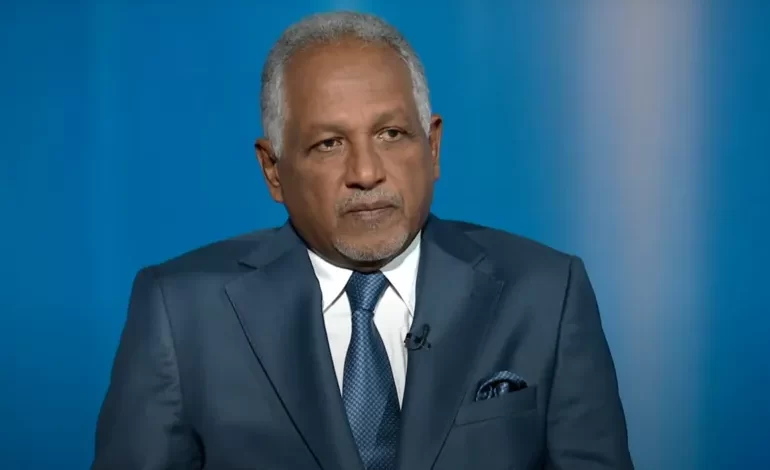Important Files on the Desk of the New Prime Minister

Sudan Events – Agencies
The nomination of Ambassador Dafallah Al-Haj Ali to the position of Prime Minister at this critical juncture in Sudan’s history likely comes after careful and thorough examination of his biography, academic path, and professional journey. His career began in the Ministry of Foreign Affairs in 1980, during which he gained renewed skills and exceptional experience over 45 years, making him the best choice for this significant and important position. As the head of the executive branch, the Prime Minister must possess personal qualities and diverse expertise that enable him to grasp the intricacies of managing the country through a national Council of Ministers.
A Nomination After a Long Vacancy:
The nomination of Ambassador Dafallah Al-Haj Ali comes after a long vacancy that began on the evening of Wednesday, April 10, 2019. On the morning of Thursday, April 11, 2019, the First Vice President, Lt. Gen. Awad Ibn Auf, announced the end of President Omar Hassan Ahmed al-Bashir’s rule and the establishment of a Transitional Military Council headed by him. However, on the evening of Friday, April 12, 2019, he stepped down, and Lt. Gen. Abdel Fattah al-Burhan became the head of the Transitional Military Council. Al-Burhan then entered into negotiations with the Forces of Freedom and Change, which lasted over four months and concluded with the signing of the Constitutional Declaration. Based on this, Dr. Abdalla Adam Hamdok was appointed Prime Minister from September 17, 2019, until October 25, 2021, and again from November 3, 2021, until January 8, 2022, when he resigned. Since then, Mr. Othman Hussein, Secretary-General of the Council of Ministers and Acting Minister of the Prime Minister’s Office, has served as the Acting Prime Minister.
Pending Files:
This extended vacancy in such a vital position has left many important files awaiting resolution on the Prime Minister’s desk, including:
Rebuilding Sudan’s foreign relations, which have suffered many issues since April 2019 (foreign interventions by certain countries and international/regional organizations; reinstating Sudan’s African Union membership suspended after October 25, 2021; foreign debt; addressing the ICC file and the debate over signing/ratifying its charter; closing the human rights file; innovating Sudanese-American relations).
Restoring balance to Sudan’s economy, which has been strained by inflation, currency devaluation, and the ongoing war’s economic impacts.
Forming a national Cabinet composed of experienced, competent individuals, free from regional, ethnic, tribal, or professional affiliations, and capable of addressing Sudan’s historical challenges.
Completing the structures of state and local governance to achieve vertical and horizontal expansion, ensuring equitable distribution of services, sustainable development, and fair representation at lower levels.
Implementing an emergency plan to rebuild areas affected by the war.
Rebuilding the civil service on new foundations to empower the state’s executive apparatus to resume its roles, as emphasized by Lt. Gen. Abdel Fattah al-Burhan at the recent civil service conference in the temporary administrative capital, Port Sudan.
Strengths and Weaknesses:
The incoming Prime Minister faces major responsibilities, accompanied by opportunities, threats, strengths, and weaknesses, all requiring strategic vision that recognizes the nation’s dire situation—now further compounded by war.
Strengths include:
A unified national will that can guide the country toward a hopeful future by completing a transitional phase that leads to democratic elections.
Awareness by the top military leadership of the current threats, prompting them to address the ongoing rebellion and then prepare for a transition that enables the people to choose their leadership freely.
Realization by many of the youth who led the 2018–2019 revolution of the errors committed in post-Bashir Sudan, which was hijacked by parties more interested in implementing foreign agendas than national aspirations—leading to a devastating war.
Broad awareness among Sudanese citizens, both inside and abroad, of the foreign schemes enabled by post-revolution governments, and their willingness to support a transitional government that fulfills national goals.
Weaknesses include:
Fragile social fabric, especially in former conflict areas where the rebel militias have used enticement or coercion to gain support.
Weak and politically immature current and potential political forces, lacking past democratic experience.
Collapse of the civil service to a shocking degree, turning it into a gateway for corruption and favoritism.
Youth alienation due to widespread unemployment and lack of opportunities aligned with their aspirations.
Opportunities include:
Sudan’s vast visible and hidden natural resources that, if invested wisely, could ensure sustainable development.
Potential to establish balanced international and regional relations (with countries and organizations), enabling fruitful exchanges in industries, technology, education, training, and capacity-building.
Potential to rebuild the bureaucratic executive apparatus on firm civil service principles and introduce vocational and technical education, alongside serious and professional adoption of e-government programs.
Ability to introduce modern intermediate technologies in agriculture and livestock production to close gaps in the states and localities.
Threats include:
Ending societal tension caused by rising hate speech across Sudanese communities, exacerbated by excessive use of social media during the war.
Alleviating the psychological frustration of youth who led the 2018–2019 revolution, but whose hopes remain unfulfilled despite their sacrifices.
Reintegrating more than 13 million unorganized productive individuals back into traditional livelihood systems.
Rebuilding trust among Sudanese communities, especially in areas that supported or were reclaimed from the rebellion.
In conclusion, if the incoming Prime Minister aims to succeed in this historic mission, he must adopt a strategic plan for the transitional period, as outlined in the February 2025 amendment to the 2019 Constitutional Declaration. This strategy should integrate lessons from the past, address the current realities, and pave the way for a brighter future.
Source: “Sudanese Echoes”



